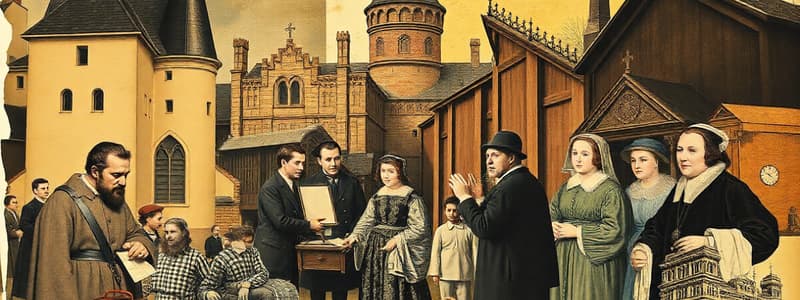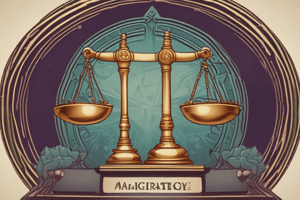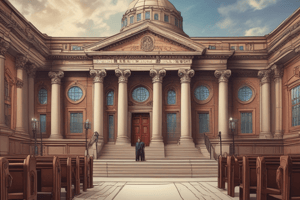Podcast
Questions and Answers
What was one of the primary tools used by secular rulers during the Reformation?
What was one of the primary tools used by secular rulers during the Reformation?
- Confiscation of church property (correct)
- Development of new religious doctrines
- Promotion of religious freedom
- Collaboration with independent reform movements
The Magisterial Reformation had minimal effect on the political landscapes of modern Europe.
The Magisterial Reformation had minimal effect on the political landscapes of modern Europe.
False (B)
What role did local rulers play in the Reformation?
What role did local rulers play in the Reformation?
Local rulers decided which reformation approach would apply within their territory.
The close relationship between church and state laid the groundwork for future _______ and political landscapes.
The close relationship between church and state laid the groundwork for future _______ and political landscapes.
Match the following elements of church and state dynamics during the Reformation:
Match the following elements of church and state dynamics during the Reformation:
Who was the key figure that initially hoped for church reform but became a political reformer?
Who was the key figure that initially hoped for church reform but became a political reformer?
The Magisterial Reformation emphasized the separation of church and state.
The Magisterial Reformation emphasized the separation of church and state.
Name one significant impact of the Magisterial Reformation on society.
Name one significant impact of the Magisterial Reformation on society.
Ulrich Zwingli's reformation was more __________ compared to others.
Ulrich Zwingli's reformation was more __________ compared to others.
Match the key figures with their primary contributions:
Match the key figures with their primary contributions:
Which theological aspect was emphasized by the distinctive reformation movements?
Which theological aspect was emphasized by the distinctive reformation movements?
Greater literacy and availability of the Bible had no significant impact on individual study during the Reformation.
Greater literacy and availability of the Bible had no significant impact on individual study during the Reformation.
The concept of a __________ church was central to the social order established by the Magisterial Reformation.
The concept of a __________ church was central to the social order established by the Magisterial Reformation.
Flashcards
Magisterial Reformation
Magisterial Reformation
A religious reformation movement led by state authorities, primarily in German-speaking Europe, that differed from other movements by its tight connection to political power.
Key Figures of the Reformation
Key Figures of the Reformation
Martin Luther, Philipp Melanchthon, Ulrich Zwingli, and John Calvin were key figures in the Magisterial Reformation, each contributing to shaping the different expressions of Protestant thought.
State-sanctioned Reformation
State-sanctioned Reformation
The Magisterial Reformation emphasized the authority of the state in promoting and enforcing religious reforms.
Religion and Civic Life
Religion and Civic Life
Signup and view all the flashcards
State-Controlled Churches
State-Controlled Churches
Signup and view all the flashcards
Strict Disciplinary Measures
Strict Disciplinary Measures
Signup and view all the flashcards
Bible as Ultimate Authority
Bible as Ultimate Authority
Signup and view all the flashcards
Impact of the Magisterial Reformation
Impact of the Magisterial Reformation
Signup and view all the flashcards
Secular Rulers' Influence
Secular Rulers' Influence
Signup and view all the flashcards
Church and State: A Close Partnership
Church and State: A Close Partnership
Signup and view all the flashcards
New Structures for Religion
New Structures for Religion
Signup and view all the flashcards
Magisterial Reformation's Legacy
Magisterial Reformation's Legacy
Signup and view all the flashcards
Magisterial Reformation: State-Led Change
Magisterial Reformation: State-Led Change
Signup and view all the flashcards
Study Notes
Introduction
- Magisterial Reformation encompassed Protestant Reformation movements, led by state authorities, primarily in German-speaking Europe.
- It contrasted with other reform movements due to its close ties to political and earthly power structures.
- This contrasted with the more individualistic or grassroots approaches seen in some other Reformation streams.
Key Figures and their Roles
- Key figures included Martin Luther, Philipp Melanchthon, Ulrich Zwingli, and John Calvin.
- Luther, initially advocating for church reform, was later drawn into political reform as secular rulers embraced his ideology.
- Melanchthon developed Lutheran faith concepts and shaped theological and educational systems.
- Zwingli's reform movement, while independent initially, found common ground with others, despite disagreements.
- John Calvin's Geneva reforms heavily influenced Protestant movements in France, Scotland, and the Netherlands.
Key Characteristics
- State-sanctioned reformation was emphasized.
- Religious aspects were directly incorporated into civic life.
- State-controlled churches were established.
- Order and unity were prioritized in reformed societies, often with strict disciplinary measures.
- The Bible was the ultimate authority.
- Each area adopted reformation practices and ideologies differently, influencing the interplay between church and state.
Impact on Society
- The Reformation significantly impacted Europe's political, social, and religious landscapes.
- New social organizations and governance, including religious-based educational systems, were introduced.
- Local schools were established.
- Local governance practices were reformed.
- A stricter moral code emerged.
- A "state church" became a core principle of social order.
- Religious conflict and persecution were widespread, including religious wars.
- Increased literacy and Bible availability enhanced individual study and interpretation.
- Economic and social transformations occurred due to new laws and practices, sometimes resulting in conflicts.
Distinctive Theological Aspects
- Justification by faith alone and scripture's sole authority were emphasized.
- Specific theological systems (e.g., Lutheran and Reformed) developed.
- Preaching and scripture's interpretation were crucial.
The Role of Secular Rulers
- Secular rulers actively controlled church affairs, consolidating power and resolving conflicts through the Reformation.
- This involved confiscating church property and applying reformed ideas to daily life.
- Local rulers determined reformation approaches within their territories.
- Political power consolidation often resulted.
Interplay between Church and State
- A close relationship between church and state existed.
- The state played a key role in religious life governance.
- Structures like consistories or town councils assumed significance.
Conclusion
- The Magisterial Reformation deeply impacted modern European development.
- The close church-state relationship prepared the ground for future religious and political landscapes.
- This differed from other reform movements, which were more independent of the state.
Studying That Suits You
Use AI to generate personalized quizzes and flashcards to suit your learning preferences.




